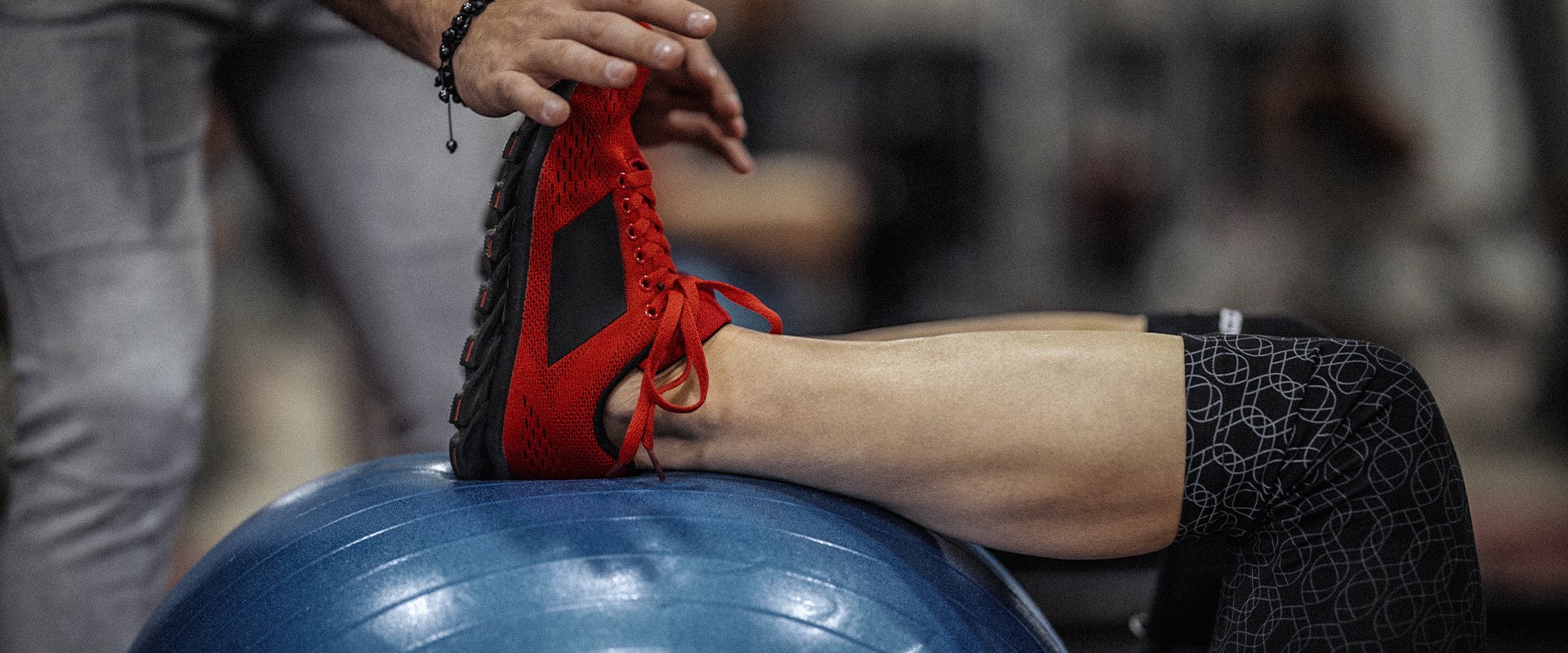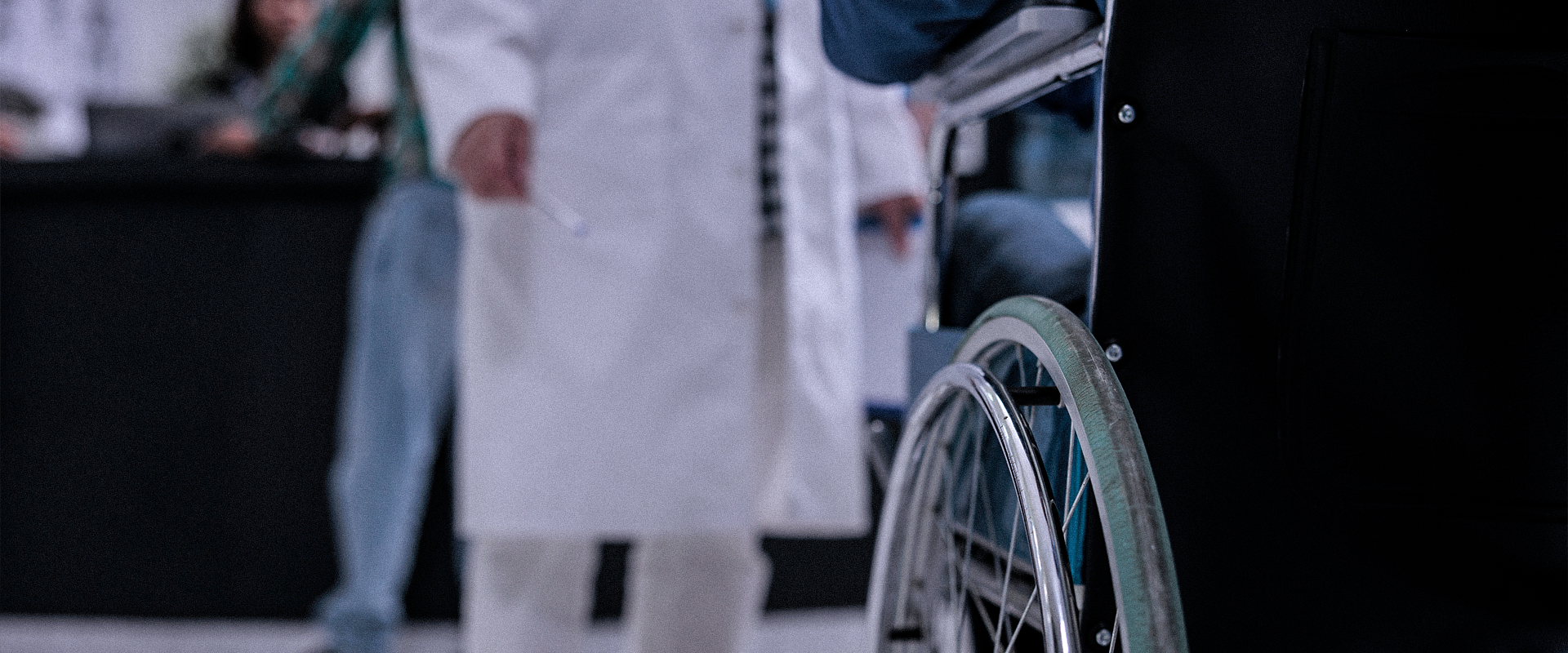
Neuromuscular Physical Therapy
AT EVOLVE
HOW CAN NEUROMUSCULAR PHYSICAL THERAPY HELP ME?
Neuromuscular diseases affect the function of the muscles due to their impact on the muscles and nerves in the body. Many find that they have more difficulty completing daily tasks due to these symptoms. Physical therapy is a helpful tool to address muscle weakness and to help those living with neuromuscular conditions improve their overall function, address pain and learn how to exercise safely.
WHAT DOES NEUROMUSCULAR PHYSICAL THERAPY LOOK LIKE?
Neuromuscular physical therapy is an individualized program tailored to your needs. My team of therapists and I will always start by getting to know your concerns and goals and perform a thorough physical exam to see how your body is moving and functioning. With neuromuscular physical therapy it is important that your therapist meets you where you are and the initial assessment as well as intermittent reassessments will ensure you are adequately challenged while still keeping you safe.
HOW DO I KNOW IF NEUROMUSCULAR PHYSICAL THERAPY IS RIGHT FOR ME?
If you have been diagnosed with a neuromuscular disease then there is a good chance you are an excellent candidate for physical therapy. If you are experiencing some difficulties performing your usual tasks then PT is a great option to help restore function or learn to compensate for that loss. Similarly, even if you feel like you are getting along great, PT may still be a helpful tool for establishing a regular exercise program to help you safely maintain your strength and function for as long as possible. Physical therapists are specially trained to prescribe exercise in the setting of health conditions such as a neuromuscular disease.
HOW DO NEUROMUSCULAR DISEASES AFFECT THE BODY?
As you may have guessed by the name, neuromuscular disease, it refers to a group of disorders affecting the nerves and the muscles they supply. Some neuromuscular diseases affect the nerves that transmit motor and sensory information between the brain and muscles while others target the muscles themselves. Because of this, the most common symptom of these diseases is muscle weakness and wasting as either the muscles themselves or the nerves that carry motor information to the muscles are not functioning normally. While muscle weakness is the primary symptom of these diseases, due to weakening of the musculature, individuals may experience stiffness, cramping, aches and pains, twitching and tingling.
Many of these conditions are inherited but not all of them. They tend to be progressive which means symptoms worsen over time. There are many different neuromuscular diseases that physical therapists treat but they can generally be broken down into several subcategories.
Let’s take a look at these categories and some examples of neuromuscular diseases that fall within each subcategory. Note, there are many more neuromuscular diseases than are listed below and we are here to assist you no matter which one you have.
Muscular dystrophies:strong> a group of diseases that cause weakness and degeneration of the skeletal muscle due to their effect on the muscle cells
- Duchenne Muscular Dystrophy
- Becker Muscular Dystrophy
- Limb Girdle Muscular Dystrophy
- Oculopharyngeal muscular dystrophy
Motor Neuron Diseases:strong> a group of diseases that cause progressive deterioration of the motor neurons–nerves that supply the muscles and signal them to contract
- Amyotrophic Lateral Sclerosis (ALS)
- Spinal Muscular Atrophy
- Spinal-Bulbar Muscular Atrophy
Ion Channel Diseases: these diseases are caused by defects in proteins called ion channels. Muscular weakness, periodic paralysis or absent muscle tone are hallmarks of these conditions
- Myotonia Congenita
- Hyper/Hypokalemic Periodic Paralysis
Mitochondrial Diseases: mitochondria produce energy within the muscle cells. This subcategory of diseases is caused by an impairment in mitochondrial function
- Friedreich's Ataxia
- Mitochondrial myopathies
Myopathies: a large umbrella category of diseases characterized by impaired functioning of the muscle cells
- Congenital myopathies
- Distal myopathies
- Endocrine myopathies
- Inflammatory myopathies Polymyositis Inclusion-Body Myositis Dermatomyositis
- Metabolic myopathies
- Myofibrillar myopathies
Neuromuscular Junction Diseases: Where the motor nerve and the body of the muscle meet is called the neuromuscular junction. Several very important processes occur at this junction that facilitate the contraction and relaxation of muscles
- Myasthenia Gravis
- Lambert-Eaton myasthenic syndrome
- Congenital myasthenic syndromes
Peripheral Nerve Diseases: while the central nerves are those that travel within the brain and spinal cord, the peripheral nerves travel in the periphery of the body to the skin, muscles and organs. Impairments in these nerves can cause both loss of muscle function and sensation.
- Charcot-Marie-Tooth disease (CMT)
- Giant axonal neuropathy
Why will our physical therapists focus on restoring alignment, breathing, and posture?
Restoring Alignment & Muscle Symmetry: With the ever-changing nature of the human body, you may find that your muscles have shifted. Exercises used with physical therapy for back pain can help you to restore muscle symmetry, as well as the alignment of your spine.
Breathing Exercises: With back physical therapy focusing on breathing is very important. By utilizing rotational angular breathing, you can focus on rotating the spine to assist with reshaping your ribcage and any affected muscle tissue.
Posture Awareness: When someone has back pain or a back injury, there are certain postures that may make their condition worse. Therefore, it is important to be aware of your posture. Once you are aware of how different postures may affect you, it will be easier to begin trying to correct your spinal curve.
Pain Management: People living with back pain typically have to tolerate back pain related aches and pain everyday, leading to a loss of quality of life. Our physical therapists can help by using different manual therapy techniques and other modalities, along with specialized stretches, massages, and exercises to help reduce pain associated with back pain.
How can Back PT Help My Back Pain?
- Help to stabilize the curve of your spine
- Promote better pelvic alignment
- Allows for mobilization of any stiff muscles
- Improvement of posture
- Enhances neuromuscular control
- Assists in relieving pain
- Greater muscle strength
- Improved cardiac function
- And it even help you breathe easier
End Injury Progression
Physical therapy for a neuromuscular condition has proven to slow and even stop back pain issues and injury progression in many cases.
Relieve Pain
The movements used in this technique can target your lower back, upper back, hips, shoulders, and neck helping you to manage pain during the course of your physical therapy treatments.
Improve Range of Motion
Posture awareness is an important area to focus on due to the fact that certain positions may cause you further back pain.
Restore Mobility
You can gain mobility and flexibility by taking part in the stretches and exercises as prescribed by your physical therapist.
WILL PHYSICAL THERAPY STOP THE PROGRESS OF A NEUROMUSCULAR DISEASE?
Unfortunately we cannot stop the ultimate progression of neuromuscular diseases with physical therapy which is why it is so important that you are under the regular care of a neuromuscular disease specialist as they may have medical treatments that can slow the progression. So while we cannot stop the progression all together, this does not render physical therapy useless for these conditions. In fact, the opposite is true!
Physical therapy can be extremely beneficial to those living with neuromuscular diseases. Participation in an individualized physical therapy program is aimed at safely maximizing the strength that you have available, preventing loss of strength and function that comes from decreasing overall activity levels and achieving many more helpful goals.
WHAT ARE THE GOALS OF PHYSICAL THERAPY FOR NEUROMUSCULAR DISEASES?
Ultimately, my team and I want your physical therapy program to support your goals. Having a personalized goal to work toward helps you feel dedicated and committed to the program. In general though, some of the goals that we as therapists have in mind when addressing a neuromuscular disease are as follows:- Improve the ability to navigate the home and community safely, efficiently and independently
- Prevent losses of balance and falls
- Prevent the onset of chronic diseases or conditions associated with decreased mobility and overall fitness that may result from a neuromuscular disease. This may include diabetes, hypertension or vascular disease
- Maintain range of motion in all joints
- Educate you on your condition and on lifestyle changes and strategies that may help you manage the condition such as energy conservation and pacing
- Evaluate for and prescribe appropriate assistive devices including mobility aids and bracing to help you get around and perform daily tasks better
- Address pain whenever possible
- Help you perform self-care and activities of daily living with greater independence
If you decide to work with a back pain physical therapist to help correct your upper back or lower back issues, your entire treatment plan could consist of around 8-20+ different physical therapy for back pain sessions that will each last 60-90 minutes. Once you complete your customized back pain physical therapy treatment plan, you will be able to continue to do the prescribed stretches and exercises utilized during your back pain PT sessions yet in the comfort of your own home.
Call to Schedule a Consultation! 1-718-258-3300Brooklyn Physical Therapy Clinic Locations
Mill Basin (located in Harbor Fitness)
6161 Strickland Ave
Brooklyn, NY 11234
Monday: 7am-8pm
Tuesday: 7am-8pm
Wednesday: 8am-5pm
Thursday: 7am-8pm
Friday: 8am-1pm
Park Slope (located in Harbor Fitness)
550 5th Ave.
Brooklyn, NY 11215
Monday: 9am-8pm
Tuesday: 8am-6pm
Wednesday: 9am-8pm
Thursday: 8am-6pm
Friday: 8am-3pm
Gravesend
372 Avenue U
Brooklyn, NY 11223
Monday-Thursday: 8am-8pm
Friday: 8am-3pm
Midwood
945 Kings Highway
Brooklyn, NY 11223
Monday-Thursday: 12pm-8pm
Ready to take the next step to a healthier you?
Contact Us Today!
NEUROMUSCULAR PHYSICAL THERAPY AT EVOLVE!
Need Neuromuscular Physical Therapy?
Let our caring and compassionate physical therapists help you with relieving pain while getting you back on your feet comfortably.
Call now to schedule your first Neuromuscular PT consultation free of charge.
Call: 1-718-258-3300







